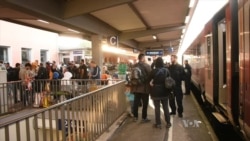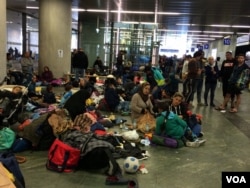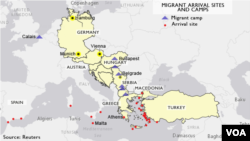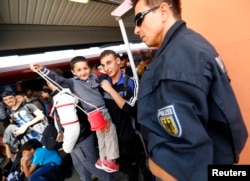Germany’s decision to implement border restrictions has not stopped the flow of migrants into the country, which is now taking extraordinary measures to deal with the massive influx.
German officials said they had taken at least 1,000 undocumented people into custody at the border crossing with Austria on the main rail and highway route between Vienna and Munich.
In an unprecedented step, German police boarded trains and checked documents of passengers entering from Austria and Hungary. Hundreds of migrants and refugees, mostly from Syria, were escorted off the trains at Freilassing and put in a holding area where they were called, one by one, to be fingerprinted, registered, and boarded on buses for transfer to other parts of Germany.
Stop and search
German police were also stopping and searching cars on the highway at the border, snarling traffic for several kilometers. Some motorists said they waited three hours to cross the border on Monday night.
The decision to impose border restrictions effectively suspended Germany’s participation in the 1985 Schengen agreement that provides for free movement within Europe’s member states.
For the refugees making the journey on Monday and early Tuesday, it meant more anxiety at the end of a difficult month-long journey.
“I don’t know why we got off the train,” said one refugee from Syria, who asked a reporter not to use his name or show his face.
“They told us to come and do a check for health, give us food, and did not move after that," he said, as he stood behind a police line on the station platform. “I do not know what will happen the next day. Where we’re going now, I do not know.”
Some of the refugees said they were worried about being fingerprinted, a concern they have expressed throughout the journey out of fear that establishing a record may result in their deportation or exclusion from EU countries.
Anxious but resolute
News - albeit inaccurate - that Germany had closed its border with Austria caused anxiety, but it did not change the resolve of hundreds of migrants.
A Syrian refugee who also asked not to be identified, said he heard about the border restrictions while in Austria and decided to come anyway.
“Somebody told me that Germany had closed the border,” he said. “We decided that our chances would not be good by train, so we decided to come here walking. We saw a river, removed our vestments and swam.”
German officials expect one million migrants to enter this year. They suggest their reason for imposing border restrictions is meant more as a measure to establish control over an influx that shows few signs of letting up.
“The biggest challenge is logistics,” said Rainer Scharf, a spokesman for German federal police. “It is difficult to get all the people to the buses in an organized way, as well as giving them food. We have to accommodate them for the process of registration and proceed them to other refugee centers throughout Germany.”
Those being detained at the border are held in custody for attempting to migrate illegally, without passports or visas. German authorities are then sending them to registration centers, in most cases letting them settle temporarily and then allowing them to apply for asylum.
Destination of choice
Germany is the destination of choice for the vast majority of migrants interviewed by VOA along various points of the journey through the Balkans, Hungary, and Austria.
Many of the migrants are professionals and businesspeople who say it is not economic reasons but fear for their personal safety in Syria, where rebels are battling the forces of President Bashir Assad. They chose Germany because of its reputation as a place where immigrants get substantial social benefits that include housing, education, subsistence and health.
But once here, the dream has often not materialized, or at least not quickly enough.
Honas Issa, a 23-year-old information technology specialist from Syria, said he applied for asylum in Germany more than a year ago and he passed through the Freilassing train station on the way back from the government office that is handling his application.
He said the authorities have lost his file. “I’ve called them, no answer,” he said.
Issa said that while his application has been in process, he is not allowed to work and is living on public funds that barely cover food expenses. He feels he is losing time, and patience.
“I’m not so happy to sleep at home, 24 hours, like old people. I am young. I have an urge to study, to do something. I have good experience. I have a Microsoft certificate. I can do a lot, but nobody cares about that.”
Sweden
Some of the migrants say they want to continue on to Sweden which, like Germany, has a reputation for welcoming the migrants and offering them assistance.
On another platform at the station, a Syrian refugee waits for instructions from police on where to go next. He plans to go the Netherlands, where he has friends and family.
Glancing at the large group starting to assemble in the holding area, he explains his decision to not stay in Germany. “There're too many people staying here in Germany. Maybe this will make it troublesome for me to find work and settle.”








